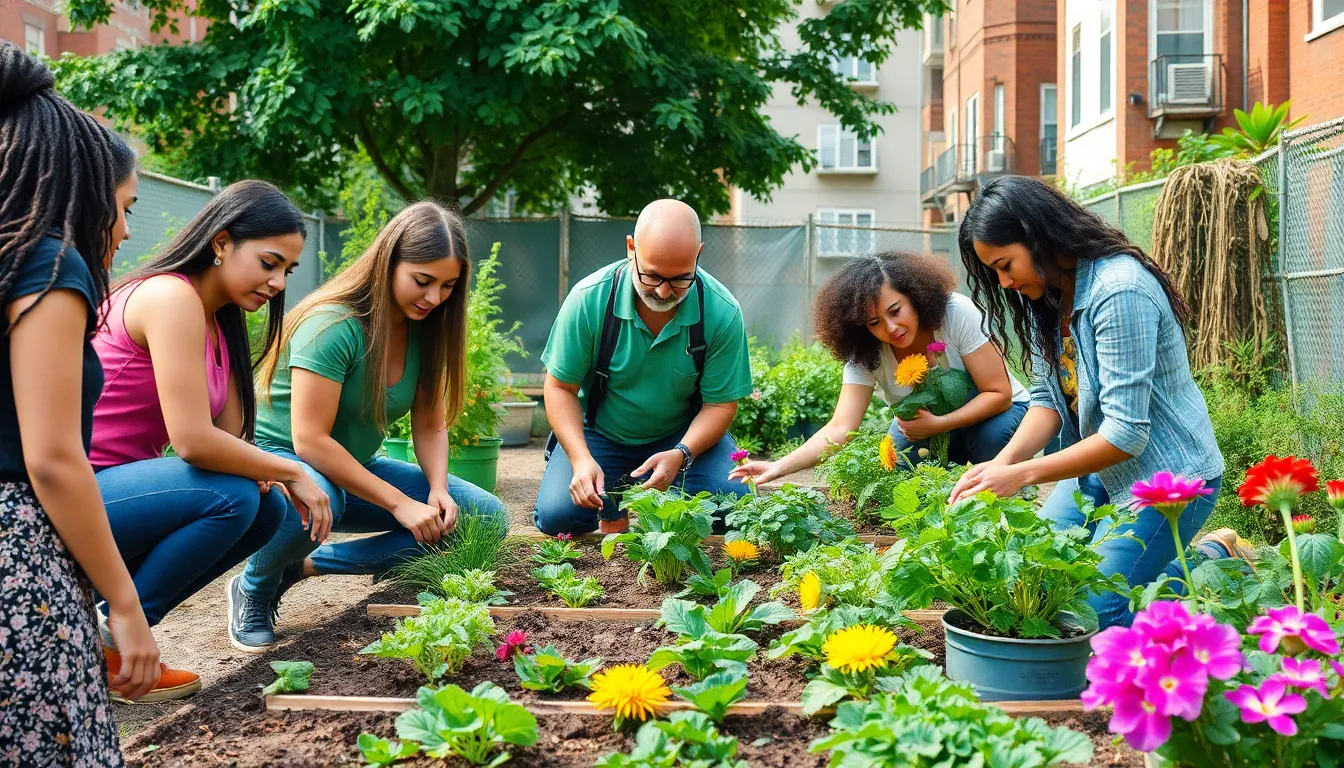As the world population skyrockets like a cat on a hot tin roof, the need for sustainable practices becomes more urgent than ever. With more mouths to feed and more feet to put on this planet, it’s clear that our current habits won’t cut it. Imagine trying to squeeze an elephant into a mini cooper—something’s gotta give!
But fear not! Embracing sustainability isn’t just about saving the planet; it’s about ensuring a future where everyone can thrive. By adopting smarter practices, we can tackle challenges head-on and turn our growing numbers into a force for good. So buckle up and get ready to explore how increasing our commitment to sustainability can help make the world a better place for generations to come.
Table of Contents
ToggleOverview of Global Population Trends
Increased global population necessitates comprehensive approaches toward sustainability. Understanding current and future population dynamics helps shape those approaches.
Current Population Statistics
As of 2023, the world’s population exceeds 8 billion individuals. Rapid growth in regions like Africa and Asia accounts for a significant portion of this increase. Urbanization influences population density, with cities accommodating over half the global populace. Data from the United Nations indicates that by 2050, urban areas could host more than 68% of people worldwide. Resource consumption patterns reflect these statistics, with increased demand placing strain on water and energy supplies.
Future Projections
Global population projections suggest a rise to approximately 9.7 billion by 2050. Growth rates may decline, yet regions like sub-Saharan Africa may see a surge. This population increase will intensify the need for sustainable practices across various sectors. Climate change and resource depletion present substantial challenges that demand immediate attention. By 2100, projections may reach about 10.4 billion, emphasizing the importance of establishing robust sustainability initiatives now. Addressing these foreseeable trends can help mitigate future impacts and drive positive change.
Importance of Sustainable Practices

Sustainable practices play a crucial role in addressing the challenges posed by increasing global population. Understanding sustainability’s essential definition aids in recognizing its importance.
Definition of Sustainability
Sustainability refers to meeting present needs without compromising the ability of future generations to meet theirs. It encompasses various domains such as environmental, economic, and social factors. Effective sustainable practices promote resource conservation and promote equitable access. They aim to minimize environmental impacts while ensuring social well-being. Consequently, integrating sustainability into daily life becomes vital as population growth accelerates.
Benefits of Sustainable Practices
Embracing sustainable practices delivers numerous benefits. Environmental protection stands out as the most compelling advantage. Such practices help to reduce waste and conserve natural resources. Economic resilience emerges when communities adopt sustainable strategies, leading to increased efficiency and cost savings. Social benefits enhance community well-being and foster healthier living environments. Ultimately, sustainable practices support a balanced relationship between humans and nature, ensuring a better quality of life for an expanding global population. Sustainability initiatives contribute positively to combating issues like climate change, thus paving the way for future stability.
Challenges Posed by Population Increases
Population growth intensifies various challenges, necessitating sustainable practices across multiple sectors. Countries must address these issues urgently to maintain balance.
Resource Depletion
Increased population leads to higher demands on resources like water and food. Agriculture faces pressures to produce more, often resulting in over-extraction and soil depletion. Water scarcity emerges as a significant concern, especially in densely populated regions. Current estimates show that by 2025, nearly 1.8 billion people might live in areas with absolute water scarcity. Energy consumption also skyrockets, straining fossil fuel reserves. Sustainable resource management techniques are vital, ensuring that future generations access essential resources without compromising the environment.
Environmental Impact
Population growth contributes to rising carbon emissions and pollution levels. Urban areas, now home to over 50% of the world’s population, face significant air quality issues. Projections suggest that urbanization could lead to an increase in urban heat islands, further exacerbating the situation. Ecosystems suffer as habitats are lost to urban expansion and resource extraction. By 2100, climate change could displace millions, underscoring the need for sustainable urban planning and energy practices. Reducing waste and fostering green technologies support environmental preservation while accommodating growing populations.
Sustainable Solutions for a Growing Population
Sustainable practices serve as essential responses to an expanding global populace. Multiple sectors must adapt to meet the challenges presented by this growth.
Renewable Energy Sources
Renewable energy sources play a crucial role in sustainability. Switching to solar, wind, and hydroelectric power reduces reliance on fossil fuels, which effectively lowers carbon emissions. In 2020, renewable energy accounted for about 29% of global electricity generation. Continuous advancements in technology improve efficiency, making these sources more viable. By investing in renewables, nations can create jobs, stimulate economic growth, and ensure a cleaner environment for future generations. Additionally, integrating renewable energy into existing infrastructure enhances overall energy security and resilience.
Sustainable Agriculture
Sustainable agriculture practices emphasize resource conservation and ecological balance. Techniques such as crop rotation, permaculture, and agroforestry enhance soil health while maximizing yield. The rise of organic farming demonstrates a growing preference for natural products, with global organic food sales reaching $120 billion in 2021. Farmers can minimize chemical inputs by embracing sustainable practices, which helps preserve biodiversity and protect ecosystems. Equipment and methods that utilize precision farming technologies work to reduce waste and improve efficiency. Through sustainable agriculture, communities can produce food more responsibly, allowing them to nourish a larger population.
Waste Management Innovations
Waste management innovations address the mounting challenge of increasing waste from a rising population. Implementing recycling programs and composting initiatives extend the lifespan of landfills and reduce pollution. In 2021, about 2.01 billion tons of waste was generated globally, highlighting the need for efficient waste solutions. Technologies such as waste-to-energy conversion help capture energy from discarded materials, creating sustainable energy sources. Smart waste management systems utilize sensors and data analytics to optimize collection routes. By prioritizing innovative approaches, communities can manage waste sustainably and minimize environmental impacts effectively.
Role of Policy and Governance
Effective policy and governance play a crucial role in promoting sustainable practices as the world population continues to grow. Policymakers must prioritize sustainability to ensure a viable future for both people and the planet.
Government Initiatives
Governments initiate various programs to promote sustainability. For instance, nations implement renewable energy incentives to decrease reliance on fossil fuels. Legislation supporting sustainable agriculture encourages farmers to adopt eco-friendly practices that enhance soil health. Urban planning policies emphasize efficient land use and green spaces, promoting livable cities. Data from the International Renewable Energy Agency shows that renewable energy accounted for 29% of global electricity generation in 2020. As these initiatives expand, their positive impacts on both the environment and public health become apparent.
International Cooperation
International cooperation fosters a global approach to sustainability challenges. Countries collaborate through agreements like the Paris Agreement to combat climate change and work on shared goals. Joint efforts facilitate the exchange of technology and best practices in sustainable development. Organizations such as the United Nations encourage participation in initiatives that support resource conservation and equitable access. By merging resources, nations can effectively address issues such as water scarcity affecting 1.8 billion people by 2025. Strengthening partnerships will amplify sustainable practices worldwide, ensuring a healthier planet for future generations.
The world’s growing population presents both challenges and opportunities. Embracing sustainable practices is essential for creating a resilient future. By prioritizing renewable energy, sustainable agriculture, and innovative waste management, societies can address the demands of an expanding populace while protecting the planet.
Collaboration among governments, businesses, and communities will play a crucial role in driving these initiatives forward. As nations unite to tackle sustainability challenges, they can ensure a healthier environment and a higher quality of life for everyone. The path to a sustainable future is not just necessary; it’s imperative for the well-being of generations to come.



